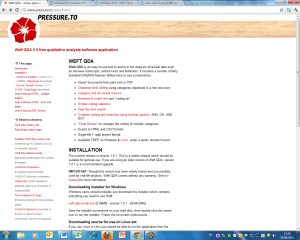I feel that Smith and Rust’s contribution in the latest edition of the Innovations in Education and Teaching International deserves the attention of everyone involved directly or indirectly in teaching in higher education. The article begins with a discussion about the links between teaching and research in the university as well as a discussion of Wegner’s ‘communities of practice’. Smith and Rust helpfully summarise Wenger’s work (‘communities of practice’ I fear is becoming a unscrutinised catchphrase in some sections of higher education and I found their paragraph on Wenger useful):
According to Wenger (1998, pp. 72-85) a community of practice has three key dimensions: it is a 'joint enterprise' involving the 'mutual engagement' of its members, who are bound together as a 'social entity' with a shared repertoire of communal resources (routines, sensibilities, artefacts, vocabulary, styles, etc.) that they have developed over time. These key requirements of joint enterprise, mutual engagement and social entity all seriously beg the question, who do we see as being members of the community. All too often, the concept 'academic community' is used in exclusive ways referring solely to the academic staff of the university. My emphasis (p. 116)
Later in the article Smith and Rust turn their attention to the work of ‘support staff’ in the university.
There have been significant increases in the numbers of staff in central support units (and therefore even further distanced from the academic community than those in academic departments) – e.g. librarians, computer technicians, counsellors, those in human resources, the registry, estates, and corporate services. There is now a need for these roles, too, to be brought into the academic mainstream instead of looking in from the outside. Members of human resources could teach in business studies or public administration, for example: counsellors could teach in psychology; librarians in publishing; computer technicians in maths, stats and computing; estates staff in land management; and corporate services in business and marketing. All of these individuals have vital and important skills and experience they can bring to academic teaching and research and to the tutoring and development of students (p. 120)
Now this is challenging bit, but the more radical proposal is to come. They continue:
In the genuine research-based academic community it is the role of support staff which needs to see the greatest changes. Indeed the demarcation between support staff and researchers and teachers should vanish with job descriptions which combine administrative and technical work with tutoring, small group teaching, and research assistance. There are, of course, at least two groups of support staff who, as well as increasing their own academic role, will also need to be centrally involved in gradually implementing the suggestions we are proposing. First, Human Resources units will have to identify the nature and extent of changes in the job descriptions of posts and develop policies and practices to recruit the ‘new breed’ of candidates to fill support staff positions. Second, Learning and Teaching units will have to develop training schemes to enhance the abilities of support staff to contribute to the research based education of students. It is in these ways that support staff can be integrated fully as equal members of the academic community and thus lose their second-class citizenship. (p.120)
At first reading Smith and Rust appear to be seeking to break down the divisions between academic staff and other staff. However the language used here seems to maintain the dichotomy between ‘support’ staff and academic staff. Perhaps the problem is in the term ‘support staff’. Whether educational developers (‘non-academic’ in some institutions), librarians, counsellors, estates staff etc., there is an underlying suggestion that support staff are not players in the ‘main game’ of higher education and are useful, but not essential to the main game. Nothing could be further from the truth of course.
Overall this article makes radical proposals and raises questions for further in-depth discussion. Can we create a true community of practice across our universities?
Reference
Pete Smith and Chris Rust, “The potential of research-based learning for the creation of truly inclusive academic communities of practice,” Innovations in Education and Teaching International 48, no. 2 (2011): 115-125. http://dx.doi.org/10.1080/14703297.2011.564005








